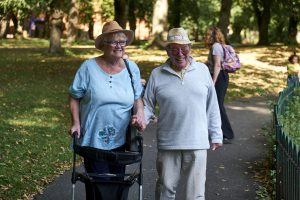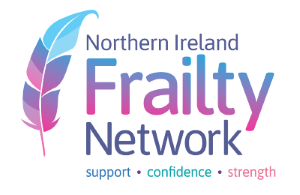Why is Ageing Well so important?
Growing older can often lead to an increasing number of major life changes and events, such as; retirement, children leaving home, health concerns and changes and potentially the loss of independence. How individuals handle and grow from these major life changes is often the key to ageing well. Frailty is a condition that becomes more common with increasing age, yet it can be prevented and treated. As it is largely linked to a person’s physical, mental and social functioning, frailty prevention is commonly directed towards these areas.
See below ways in which you can age well and avoid the onset of frailty:
1.Stay Active
The phrase ‘exercise is the best medicine’ is true for various aspects of life, especially in avoiding frailty. Evidence shows one of the best ways to reduce frailty and maintain independence is to stay active. Exercise helps individuals to maintain cardiovascular fitness, improve muscle strength, decreases the risk of reduced bone mass, improves endurance, balance and flexibility, as well as looking after emotional and mental well-being. Improving strength and balance is of particular importance in older populations as it can help reduce the likelihood of falls which happen to be a contributing factor to the loss of independence.
 Age NI teamed up with Lady Mary Peters to launch an exercise programme aimed specifically at keeping older people moving during the COVID-19 pandemic. ‘Move with Mary’ is a series of five exercise videos that cater for every level of capability, ranging from simple seated stretches to balance, strength and gentle aerobic exercises.
Age NI teamed up with Lady Mary Peters to launch an exercise programme aimed specifically at keeping older people moving during the COVID-19 pandemic. ‘Move with Mary’ is a series of five exercise videos that cater for every level of capability, ranging from simple seated stretches to balance, strength and gentle aerobic exercises.
‘To me, movement is life; it is important to keep active. These exercises are nice and gentle and will help you feel good. We have some stretches you can do whilst sitting and moves you can practice while waiting for the kettle to boil or brushing your teeth!’– Lady Mary Peters
Please follow the link below to our Move with Mary Section:
Move with Mary
2.Eat Well
Inadequate nutritional intake is a very important modifiable risk factor for the development and onset of frailty, therefore regulating nutritional intake is pivotal in its management and prevention. Malnutrition and frailty are related syndromes, with some of the main indicators being: fatigue, falls, reduced ability to fight infection, depression and even heart failure. Therefore a sufficient intake of nutrients such as protein, energy and micronutrients such as iron and calcium, is vital in reducing the risk of frailty. At meal times try to include: foods rich in starchy carbs and fibre, rich in protein, plenty of fruits and vegetables, foods containing calcium for healthy bones and drink plenty of fluids.
Age UK teamed up with Nutritional Therapist, Jane McClenaghan to launch a nutrition series called ‘Eat Well with Jane’ aimed specifically at educating people on how to enjoy their food whilst having plenty of variety in their diet.
Please follow the link below to our Eat Well with Jane section:
Eat well with Jane
3.Staying Connected
A significant challenge of aging is maintaining a strong support network. Yet keeping and cultivating meaningful relationships and spending time with other people is crucial in an older person’s mental, physical and emotional well-being. With that being said, unfortunately loneliness is a major issues for older people in today’s society and is often associate with several adverse health conditions. Loneliness has been attributed to high blood pressure, depression, dementia, cognitive decline and even death. Conversely, evidence has highlighted that maintaining close ties to loved ones, keeping your brain active and having an optimistic attitude in older age can reduce the likelihood of developing dementia and other brain related conditions by slowing cognitive decline.
 There is no reason for an older person to be lonely in later life. It is important to encourage those close to us to attend local groups or coffee mornings with people of the same age. Many towns have their own clubs and social groups that are specifically tailored towards older people and often have their own transport e.g. a bus.
There is no reason for an older person to be lonely in later life. It is important to encourage those close to us to attend local groups or coffee mornings with people of the same age. Many towns have their own clubs and social groups that are specifically tailored towards older people and often have their own transport e.g. a bus.
Age NI, with the support of the Commissioner for Older People for Northern Ireland, is offering a ‘Check In and Chat’ telephone service for everyone who is over 60 in Northern Ireland, who may feel isolated or lonely during this time. For more information please visit the Age NI website or follow the link below:
Check in and chat (ageuk.org.uk)
